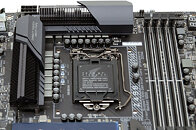Wednesday, December 16th 2020

Intel 500 Series Motherboards to Supposedly Arrive on January 11th
Intel needs a platform refresh to battle the competition, mainly speaking to battle AMD and its Ryzen 5000 series processors. That is why the company is developing 500 series of chipsets covering the low-end (H510), mid-range (B560), and high-end markets (Z590) that pair with the upcoming Rocket Lake-S processor generation. Dubbed 11th generation of Core processors, the 11th generation of Intel Core CPUs are going to be built on Intel's refined 14 nm process. The CPUs are supposed to feature a Cypress Cove core, which is a backport of Golden Cove found in Ice Lake. The 500 series motherboards are the last in the DDR4 generation, launching in the timeframe when DDR5 is supposed to take over in the coming years.
Today, thanks to Weixin, a Chinese media outlet that posted a short story on the WeChat platform, we have information about the launch date of these new chipsets. According to the source, we are allegedly going to see these new chipsets on January 11th, the day that Intel CES 2021 event is supposed to happen. The platform will include a range of motherboards from Intel's partners and is supposed to bring support for the much-needed PCIe 4.0 protocol. The launch date should be taken with a grain of salt, of course, before taking it as a fact.
Sources:
Weixin, via VideoCardz
Today, thanks to Weixin, a Chinese media outlet that posted a short story on the WeChat platform, we have information about the launch date of these new chipsets. According to the source, we are allegedly going to see these new chipsets on January 11th, the day that Intel CES 2021 event is supposed to happen. The platform will include a range of motherboards from Intel's partners and is supposed to bring support for the much-needed PCIe 4.0 protocol. The launch date should be taken with a grain of salt, of course, before taking it as a fact.

45 Comments on Intel 500 Series Motherboards to Supposedly Arrive on January 11th
So yeah, I'm really struggling with what to do about it. Though, even if I sold the Intel stuff, I'd still have my HP Envy 360 to use while waiting for Ryzen stock to regenerate.
I say just stick with what you got for now. We do not know the full results of everything (or any results for that matter). So patience.
I domt get the pcie 4.0 and ddr5 angle though. We know pcie 4.0 isn't useful in gaming even with a 3090, but for faster and more flexible storage options (which most dont need that flexibility or would notice the speed in many cases between 3.0 and 4.0 drive.
Ddr5 isn't going to make things much faster...ram isn't limiting anything.
I'm sure we'll see these announced at 'ces' on the 11th, but I don't imagine availability for weeks to months after...much closer to release of the cpu.
My point is if you're rocking a 3.0 board, you're fine until the next significant cpu upgrade anyway.
We will see these announced on the 11th but
I know backwards compatibility is hard, but for the time being Intel is in a hole, they can't afford many more moves like this.
Rumor has it RL will pretty much suck (die too big, power hungry, Intel won't be able to make many of them - no capacity). They need everything around RL to be top notch.
But whatever, I wasn't buying anyway.
Backwards compatibility isn't relevant in a discussion about moving forward. You're moving the goalposts. ;)
But good point about Z590 also being able to run CL, it slipped my mind they're both LGA1200.
Hkw many gens does X570 will support 2 or 3? zen2, zen3...zen+? Why can't 8 recall offhand?? Lol
For most it was two sets of motherboards with 775, with one supporting netburst, and the other supporting core. Two generations each.Talk about splitting hairs.
Same goes for LGA1156. Now someone might say it was two generations, but with one being 2C with IGP, and the other 4C without IGP, I just don't see it. Also, the 4C was launched first, so it didn't even make sense as an upgrade path.
Otherwise we might count AM4 APU's and CPU's separately as well, that's eight CPU's and counting (as in expecting Cezanne to become the ninth next year) . :D
While those AMD sockets you mention only had one generation, we're talking about pretty obscure sockets, as opposed to Intel's one generation sockets that were mainstream sockets.No, it's 5 years, as AM4 debuted the year before Ryzen was launched. AMD gave it 4 years of support at the Ryzen launch in 2017. In total, 2016 to 2021.
Like I said, desktop Cezanne will most likely be AM4, given that it uses DDR4, and it won't be launched this year. Besides, it's not like the current 5000 lineup is complete, nobody believes that.
So it covers two gens at a time, basically... nothing different than AMD atm... ;)
As to the performance of RL, I am looking forward to see what it will bring to the table. IPC uplift better be significant considering they have kept IPC stuck since Skylake through Comet Lake. That's 4 generations of Intel processor with 0 IPC improvement. Brute increase in clockspeed is not IPC improvement. Comet Lake mostly have the advantage when running AVX 512 applications and in games when we compare it against Zen 2. Zen 3 closed that gap and a big leap in single core performance. Perhaps RL may regain the gaming crown again, but by how much is the question.
If CL had PCIe 4.0 this wouldn't be a discussion as that is the only difference (within this motherboard context). It doesn't... but this all is in response to what bug said originally. ;)I mentioned AMD is in the same boat...then we went on a this vs. that spiral. In the end, AMD and Intel are in remarkably similar positions on the upgrade front. ;)
But the point here is, if you look at history objectively, both parties have had various degrees of success supporting multiple CPU generations on the same socket. Personally, I don't blame them, this kind of compatibility is hard (just look at all the drama around backporting support for AMD's newer Zen chips). I'll take compatibility given a chance, I just don't rely on/plan for it.